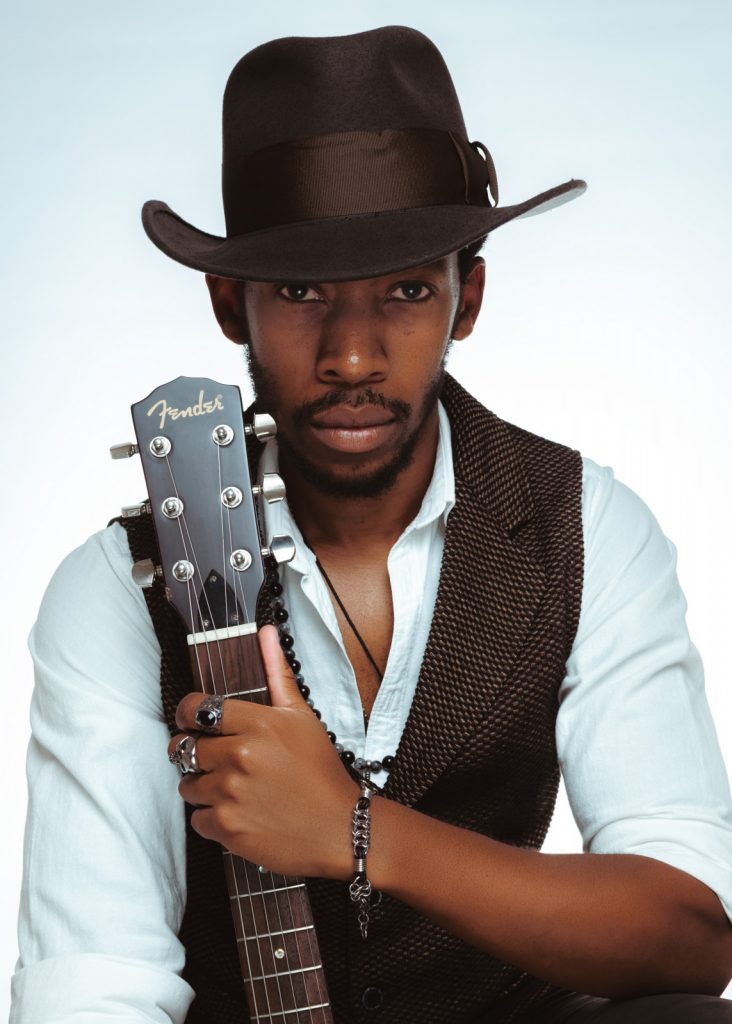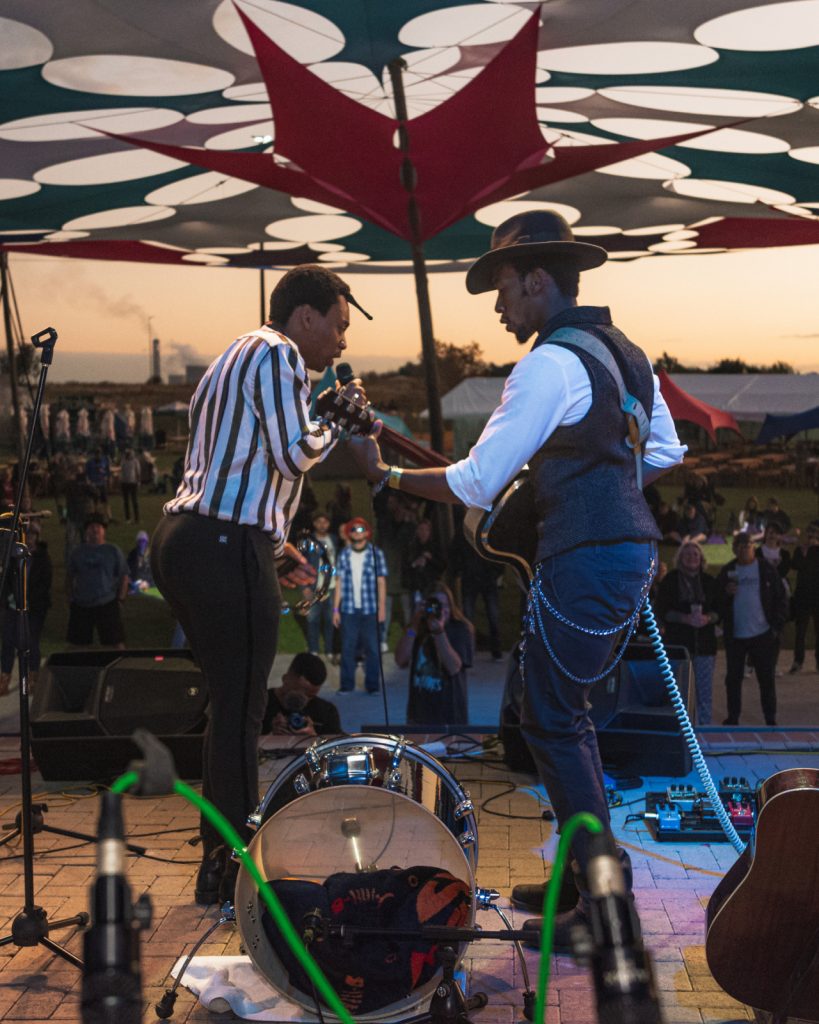MaxX & Love performing at the Misty Waters Festival in Secunda. (Photo: Evermore Photography)
It’s not often that a duo can take the stage and set it alight — particularly if the band members have played together for less than a year, and only one of them has an instrument in their hands — but this seems to be MaxX & Love’s speciality. I’ve seen them on three separate occasions and each time the crowd just couldn’t get enough, so I set out to discover what makes them unique and so loved.
What you get to see under the spotlight are two young (they’re both 28) handsome black Joburg guys who are dressed to the nines and ooze confidence. Sechaba Ramphele (Love) is a trained actor and singer who knows how to hold the audience in his palm, while MaxX Monticoe’s sweeping, soaring blues guitar licks are equally commanding. Once in a while, Love will pick up a tambourine or kick on a bass pedal to add some oomph to a beat, but generally, the voice and single instrument are enough.
They are not the first actors to sing — there’s a sizable list of Hollywood greats including Johnny Depp, Jeff Bridges, Scarlett Johansson and Jamie Foxx who like the mic — but it does mean that MaxX and Love fans get the added benefit of, in addition to the music, being treated to a SHOW.
 Sechaba Ramphele (Love), a singer you’re not likely to forget. (Photo: Evermore Photography)
Sechaba Ramphele (Love), a singer you’re not likely to forget. (Photo: Evermore Photography)
Neither of the musicians is quite sure why there’s been so much hype about their act in such a short time. “We can’t say for sure, but our focus on rooting our music in the Delta blues and allowing ourselves to grow musically from there seems to be something ironically ‘fresh’ to the audiences we’ve found ourselves performing for,” ventures MaxX.
It’s likely due to the extremely hard work they put in. MaxX expands: “Because of our theatre background, we have a high regard for our audience, and for our performance. This involves how you arrive, how you get into wardrobe, get into character, how you present your art, what you need to give your audience, how you leave the stage. This is known as ‘theatre etiquette’ in theatre circles — that’s where our theatrics come from.”
Says Love: “Working on the show involves lots of rehearsals, a lot of touching base, in terms of what songs sound good, what songs we want to play, which ones are not working. We also do very in-depth debriefs straight after shows, while it’s still fresh. This includes everyone who is part of the team, including the photographer and videographer.”
MaxX and Love met in university. MaxX majored in screen and stage acting, while Love majored in musical performance. “We somehow found ourselves in the same friend group in first year. We weren’t exactly ‘friends’ until around second year; however, there has always been a sense of respect that lingered between us, due to our work/craft and most especially our discipline,” says Love. “Respect came first, then friendship later. After graduation we didn’t see or speak to each other for more than two years. Once we met up again though, we had so much to catch up on and connect about.”
 MaxX Monticoe with his trusty guitar. (Photo: Evermore Photography)
MaxX Monticoe with his trusty guitar. (Photo: Evermore Photography)
Love had theatre training at school and was taught how to hone his singing by among others Elma and Walter Damman, former teachers at Drakensberg Boys Choir School. “Theatre is a big foundation point for our performances: how we take things from point A (us) to point B (the audience). It gave us a foundation of how to deliver narrative, and it gives us a connection point; in fact, it’s the most common ground that we have,” says Love.
MaxX & Love didn’t just materialise from nowhere; individually, they put in the “woodshedding”, the 10 000 hours of grind and polish, before they met up and began working together. There’s also a lot of attention paid to appearance. Says Love: “A lot of folk wear the same thing at sound check as they do on stage, and they deliver their performance in the same way they would if they were playing at home. That bores me to tears.”
I first thought that their dress code came from ‘50s rock ‘n rollers, but boy, was I way off the mark! MaxX fills me in: “It’s always been fascinating for me how people perceive how we look and what we play … a lot of people think we have this ‘Western’ or ‘cowboy’ look … but if you go back to the early 20s and 30s guys, like Willie Dixon, Little Walter, Muddy Waters. You knew if someone was a blues man back then, because they dressed up: they had suits, hats and elaborate hairstyles, and there was a certain pride that went with that. It’s all to do with the way you approach the stage — you don’t just get up there — our outfits need to embody the music that we’re playing and the characters that we’re projecting … we’re going more for the Southern Mississippi look.”
Behind the costumes and theatrics, however, are lyrics that reveal depth. “Creep is about my childhood self,” explains Love. “It explores darker feelings and getting those feelings out; it’s about being haunted by childhood dreams and expectations, about who you are, and who you would be in this stage of adulthood. It’s about wrestling with those feelings of inadequacy, or disappointment, to your childhood self, and learning how to be kinder to yourself as an adult, as you develop, and realise what you are capable of.”
Song writing doesn’t flow in linear fashion from lyrics to melodies, or vice versa. “Both of us come up with ideas,” says MaxX. “One of us comes with an idea, and we build from there. We do what needs to be done, depending on who can lay which brick better. We try to give space to whatever can be put on the table; then we try to work it out. A lot of our journey is organic.”
The primary genre they draw from is the blues, which they regard as the foundation of Western contemporary music. Some songs start off with a good blues progression, but somehow get deconstructed, and turn into something else.
Primary influences? “Howlin’ Wolf, in terms of performance, voice, the character he adopts,” says Love, “he taught me to love blues as a style.” For MaxX it is Lightnin’ Hopkins, who he says, “can make his guitar sound like an entire band by the way he plays it. I like the big production in minimalism.”
Asked to describe their music in more detail, the pair interrupt each other: “As much as we can say and call ourselves a ‘blues duo’, our music does not conclude at the blues. Yes, the blues might have been the steam that started this locomotive and the rails upon which our music travels, but there’s so much more to our sound. Our music can be seen as an eclectic collage that not only borrows from but aims to pay homage to all the greats that stood before us and continue to influence us.”
The most popular songs on the day you get to see them live? Love: “Our opening song Train Intro. Then there’s Smokestack Lightnin’, a cover of a Howlin’ Wolf song and I’ll Never Fall In Love, which is our closing song. It’s the first blues song that we wrote together and the only song to be in our set consistently from when we started performing. It’s also important to note that we only have one or two songs in our set at a time that are covers — everything else is original music.”
 Every now and then, Love will add some beats on a bass drum, or shake on a tambourine, but mostly, it’s just vocals and guitar holding it down. (Photo: Evermore Photography)
Every now and then, Love will add some beats on a bass drum, or shake on a tambourine, but mostly, it’s just vocals and guitar holding it down. (Photo: Evermore Photography)
MaxX: “That’s a hard one. More often than not; we’re intrigued by which song was most well received at different shows. However, songs that have not failed us would have to be I Wanna Talk To You Baby, Good Body and I’ll Never Fall in Love.”
MaxX & Love don’t have an album out but are currently busy with four different recording projects. Love says: “We’re recording a single, which will hopefully be out soon. We’ve started scoping out the recording space for that; we’re testing out recording an EP, with other musicians, to see how that works out; we’re also doing a project with Andre Kriel of Black Cat Bones, and probably the whole band, as a collaboration. We’re hoping it’s a commercial thing that can sell; and we’re doing a score for a movie, with a director who I know and have worked with before, on the importance of the father figure — it’s about sending a message out on this theme.”
MaxX expands: “For the past 10 months we’ve been focusing on refining the songs on stage, but at this stage we are shifting focus to releasing a single to begin with, and then from there we’ll see whether we need to start working on the EP or an album or another single; we’ll see what feels right and makes more sense from there.”
Interest in the pair is picking up. “There have been a couple of people who have approached us about promoting us,” says MaxX, “but we’re doing it ourselves at this point, because we have the experience in the acting industry, and the more we control, the better we feel, and the safer we feel.”